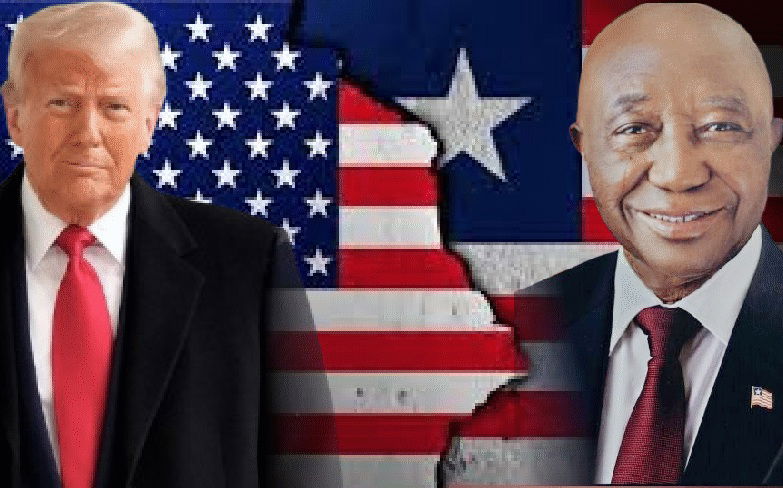Editorial The Strategic Benefits of President Boakai’s Visit to Donald Trump

In the realm of international diplomacy, every visit by a head of state carries implications far beyond the public appearances, handshakes, and ceremonial banquets. For Liberian President Joseph Nyuma Boakai, a visit to U.S. President Donald Trump as part of ongoing diplomatic engagement, political strategy, or economic exploration offers multiple strategic benefits that could enhance Liberia’s global positioning and bolster President Boakai’s domestic agenda. Liberia has long enjoyed a special relationship with the United States, dating back to its founding by freed African-American slaves in the 19th century. However, this historical bond has seen periods of neglect, especially during times of political upheaval and global shifts in U.S. foreign policy focus. A high-profile meeting with Donald Trump still an influential figure in American and global conservative politics reasserts Liberia’s visibility on the world stage. It sends a message that Liberia is not just a recipient of foreign aid or post-conflict rebuilding efforts, but an active participant in international affairs. Trump currently holds office, his ability to shape narratives and mobilize attention means any interaction with him garners significant media coverage. For Boakai, this is an opportunity to reintroduce Liberia to a global audience, define his leadership on his own terms, and attract attention to his administration’s priorities. Trump’s core supporters include a powerful segment of American business leaders, particularly in the construction, energy, and manufacturing sectors. Many of them are interested in new markets but wary of risk and uncertain political environments. By positioning Liberia as an investment-friendly, English-speaking nation with historic ties to the U.S., Boakai can appeal to this constituency. A visit with Trump could act as a bridge to conservative American investors who may not be reached through traditional diplomatic channels. With the right messaging, President Boakai can present Liberia as a stable and promising frontier for agriculture, mining, and infrastructure projects. These sectors align with Liberia’s national development priorities and its goal to reduce dependence on international aid. In addition, such a meeting might lead to commitments from conservative-aligned foundations, faith-based organizations, or private philanthropists with connections to Trump’s network expanding Liberia’s funding base for schools, hospitals, and social development programs. Domestic politics often benefit from successful international engagements. In a country like Liberia where citizens closely monitor their leaders’ ability to represent national interests abroad Boakai’s visit to a figure as globally known as Donald Trump can be framed as a diplomatic victory. Even if no immediate policy agreement or aid package results from the visit, the optics of being received by a powerful American political figure help portray President Boakai as a capable leader with international reach. This strengthens his hand against political rivals and helps consolidate support, especially among Liberia’s youth who often feel disconnected from global developments. Moreover, Boakai’s visit to Trump could allow him to frame himself as a bridge between different global powers a statesman able to work with both progressive and conservative forces to advance Liberia’s interests. That political flexibility is crucial in a world increasingly defined by polarization and competing global blocs. A proactive relationship with Trump could position Liberia favorably in the event of a Republican resurgence in Washington. Establishing a rapport now ensures that if Trump, or someone within his political circle, Liberia will have a pre-established line of communication a potential early seat at the table in future negotiations over aid, trade, or military cooperation. However, in the complex calculus of international relations, engagement rarely means endorsement. Liberia, like all sovereign nations, must be free to pursue relationships that serve its national interests including those that are pragmatic rather than ideological. If Boakai can navigate this carefully, the visit could yield rewards with minimal political cost. Perhaps the most immediate and practical benefit of the visit lies in the opportunity to clearly articulate Liberia’s development vision before a global audience. President Boakai has outlined a national agenda focused on food security, infrastructure, education, and healthcare. By meeting with Trump, Boakai can promote this agenda not only to Trump’s political allies, but to global investors, African-American communities, and diaspora Liberians seeking assurance that Liberia is on a positive trajectory. The visit also allows Boakai to press for more targeted U.S. engagement in Liberia such as Millennium Challenge Corporation (MCC) reentry, direct private sector investment, or debt relief discussions in ways that bypass traditional bureaucratic channels and appeal directly to influential political players. In today’s complex global environment, successful diplomacy requires creativity, courage, and flexibility. President Joseph Boakai’s visit to Donald Trump however unconventional reflects a calculated effort to secure Liberia’s future. It’s an example of “interest-based diplomacy” that prioritizes opportunity over ideology and long-term positioning over short-term optics. The true success of the visit will not be measured by headlines or photo-ops, but by the partnerships and resources it generates for Liberia’s people. If President Boakai can turn symbolic engagement into tangible benefits investments, goodwill, influence then this diplomatic maneuver will stand as a masterclass in 21st-century African leadership.


